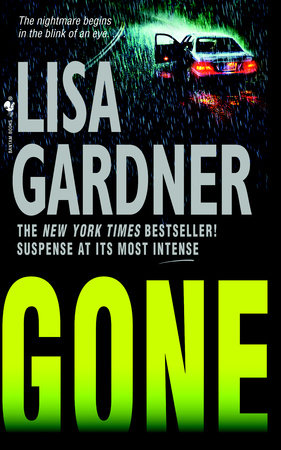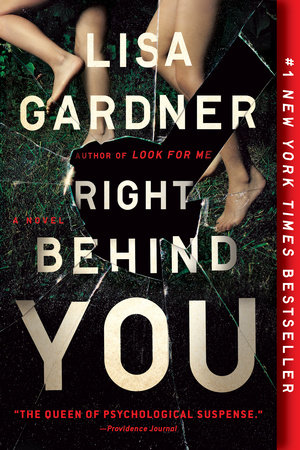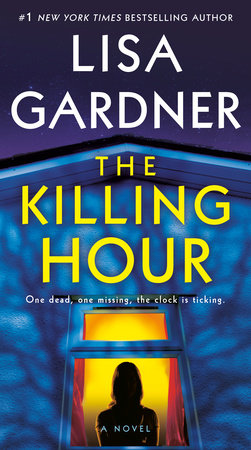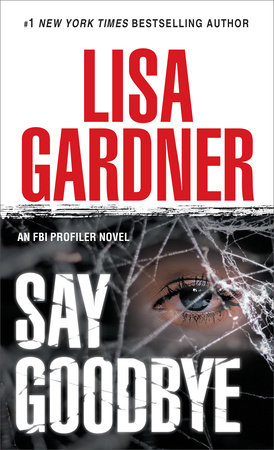Excerpt
Gone
1
Tuesday, 12:24 a.m. PST
SHE IS DREAMING AGAIN. She doesn’t want to. She wrestles with the sheets, tosses her head, tries to keep the dream version of herself from walking up those stairs, from opening that door, from entering the gloom.
She wakes up stuffing the scream back into her throat, eyes bulging and still seeing things she doesn’t want to see. Reality returns in slow degrees, as she registers the gray-washed walls, the dark-eyed windows, the empty side of the bed.
She heads for the bathroom, sticking her head under the faucet and gulping mouthfuls of lukewarm water. She can still hear the rain thundering outside. It seems like it has been raining forever this November, but maybe that’s only her state of mind.
She goes into the kitchen. Note’s still on the table. Seven days later, she doesn’t read it anymore, but can’ t quite bring herself to throw it away.
Refrigerator inventory time: yogurt, tuna fish, pineapple, eggs. She grabs the eggs, then realizes they expired two weeks ago.
Screw it, she goes back to bed.
Same dream, same images, same visceral scream.
One a.m., she gets up for good. She showers, scrounges for clean clothes, then stares at her gaunt reflection in the mirror.
“How do you spell fuckup? R-A-I-N-I-E.”
She goes for a drive.
Tuesday, 2:47 a.m. PST
“Baby's crying,” he mumbled.
“Wake up.”
“Mmmm, honey, it’s your turn to get the kid.”
“Carl, for God’s sake. It’s the phone, not the baby, and it’s for you. Snap out of it.”
Carlton Kincaid’s wife, Tina, elbowed him in the ribs. Then she tossed him the phone and burrowed back under the covers, pulling the down comforter over her mocha-colored head. Tina wasn’t a middle-of-the-night sort of person.
Unfortunately, neither was Kincaid. Sergeant Detective, Major Crimes, Portland office of the Oregon State Police, he was supposed to be prepared for these sort of calls. Sound intelligent. Commanding even. Kincaid hadn’t gotten a good night’s sleep in nearly eight months now, however, and was feeling it. He stared sulkily at the phone, and thought it had better be damn good.
Kincaid sat up straight and attempted to sound chipper. “Hell-oh.”
A trooper was on the other end of the line. Had gotten called out by a local deputy to the scene of an abandoned vehicle on the side of a rural road in Tillamook County. So far no sign of the owner at the vehicle’s site or at the owner’s legal address.
Kincaid had one question. “Is the vehicle on public or private property?”
“Dunno.”
“Well, figure it out, ’cause if it’s private, we’re gonna need consent to search the grounds. You’ll also need to contact the local DA for a warrant to search the vehicle. So get the DA rolling, buckle up the scene, and I’ll be there in”–Kincaid glanced at his watch– “fifty-five minutes.”
“Yes, sir.”
The trooper hung up; Kincaid got moving. Kincaid had been with the OSP for the past twelve years. He’d started as a trooper, spent some time on a gang task force, then transferred to Major Crimes. Along the way, he’d acquired a beautiful wife, a big black mutt, and as of eight months ago, a bouncing baby boy. Life was going according to plan, if you included in that plan that neither he nor his wife had slept or chewed their food in over half a year.
Kids kept you hopping. So did Major Crimes.
He could hear the rain coming down in sheets off the roof. What a bitch of a night to be pulled out of bed. He kept two changes of clothes in the trunk of his take-home car. Night like this, that’d get him through the first half hour. Shit. He looked back at the bed with a pang and wished it’d been the baby crying after all.
Moving on autopilot, he dug through the dresser and started pulling on clothes. He was just buttoning up his shirt when his wife sighed and sat up.
“Bad one?” she whispered softly.
“Don’t know. Abandoned vehicle over in Bakersville.”
“Baby, what’s that got to do with you?”
“Driver’s-side door’s open, engine’s still running, and purse is sitting in the passenger’s seat.”
She frowned. “That’s weird.”
“Yeah.”
“Baby, I hate the weird cases.”
Kincaid pulled on his sports coat, crossed to his wife and planted a big one on her cheek. “Go back to sleep, honey. Love you.”
Tuesday, 1:14 a.m. PST She can’t see a damn thing. Her wipers are on high speed, flailing violently across her windshield. It makes no difference. The rain comes and comes and comes. Bend in the road. She takes the turn a little too late and promptly hydroplanes.
She is breathing hard now. Hiccupping. Is she crying? It’s hard to tell, but she’s grateful to be alone in the dark.
Easing off the gas, she steers carefully back into the proper lane. There are advantages to being out this late at night. No one else on the road to be punished by her mistakes.
She knows where she is going without ever telling herself. If she thought about it, then it would be a conscious decision, which would underline the fact she has a problem. Far easier to simply discover herself pulling into the parking lot of the Toasted Lab Tavern. Half a dozen other vehicles are sprinkled across the graveled lot, mostly wide-cab pickup trucks.
The hard-core drinkers, she thinks. You have to be hard-core to be out on a night like this.
What is she doing here?
She sits in her car, gripping the steering wheel hard. She can feel herself starting to shake. Her mouth is filling with saliva. She is already anticipating that first long, cold sip of beer.
For one moment, she hangs on the precipice.
Go home, Rainie. Go to bed, watch TV, read a book. Do something, do anything but this.
She is shaking harder, her entire body convulsing as she hunches over the wheel.
If she goes home, she will fall asleep. And if she falls asleep . . .
DO NOT climb those stairs. DO NOT open that door. DO NOT peer into the gloom.
There is so much darkness inside of her. She wants to be a real person. She wants to be strong, resolute, and sane. But mostly she feels the darkness move inside her head. It started four months ago, the first few tendrils fingering the corners of her mind. Now it consumes her. She has fallen into an abyss and she can no longer see the light.
Rainie hears a noise.
Her head comes up.
She sees a large figure loom ahead suddenly in the pouring rain. She doesn’t scream. She grabs her gun.
The drunken cowboy lurches past, never knowing how close he came to losing his ass.
Rainie sets her Glock back down in the passenger seat. She is no longer trembling. She’s wide-eyed. Grim-faced. A stone-cold sort of crazy, which is far, far worse.
She puts her car into gear and heads back into the night.
Tuesday, 3:35 a.m. PST Bakersville, Oregon, was a small coastal town smack dab in the middle of Tillamook County. Nestled in the shadows of the towering coastal range inside Tillamook County. It featured endless acres of verdant dairy farms, miles of rocky beach, and from a detective’s point of view, a growing methamphetamine problem. Pretty place to live if you were into honky-tonks and cheese. Not much else to do if you weren’t, and didn’t the local kids know it.
It should’ve taken Kincaid fifty minutes to hit Bakersville. On a night like this, with zero visibility, slick mountain passes, and driving sheets of rain, it took Kincaid an hour fifteen. He pulled onto the lit-up site, breathing hard and already feeling behind the eight ball.
In the good-news department, the first responders had done their job. Three strategically placed spotlights glared into the night, high-powered beams slicing through the ribbons of rain. Yellow crime scene tape roped off a decent-sized perimeter, outside of which the vehicles were starting to pile up.
Kincaid noted a deputy’s truck, then the sheriff’s, then a slick black SUV with all the bells and whistles, which he figured belonged to the Tillamook County DA. They would need more bodies if they decided to launch a full-scale search, and they would need the forensic lab and Latent Prints to process the scene, but those would be his calls to make.
An hour and forty minutes after the first call out, they were still covering the basics: Did they, or did they not, have a crime? Most taxpayers probably liked to think the police went into these situations full bore. Notify the crime lab, bring in the National Guard, call in the choppers. Yeah, well, those same taxpayers kept hacking away at the OSP’s budget, until Kincaid now had three and a half detectives working for him instead of the original fourteen. Real-world policing meant all decisions came attached to dollar signs. For better or for worse, these days he was operating on the cheap.
Kincaid pulled in behind the monstrous black Chevy Tahoe and cut his engine. No way around it. He opened his door and stepped out into the deluge.










